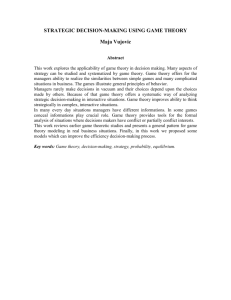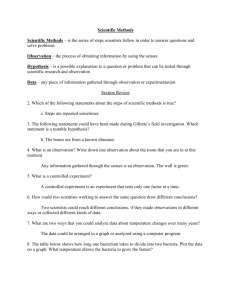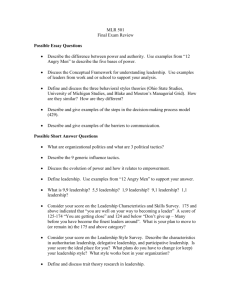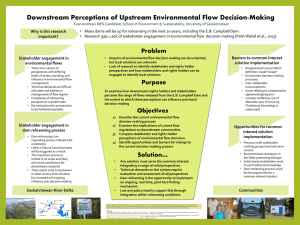Environmental Science Chapter 2 * Scientific Tools Test Review
advertisement
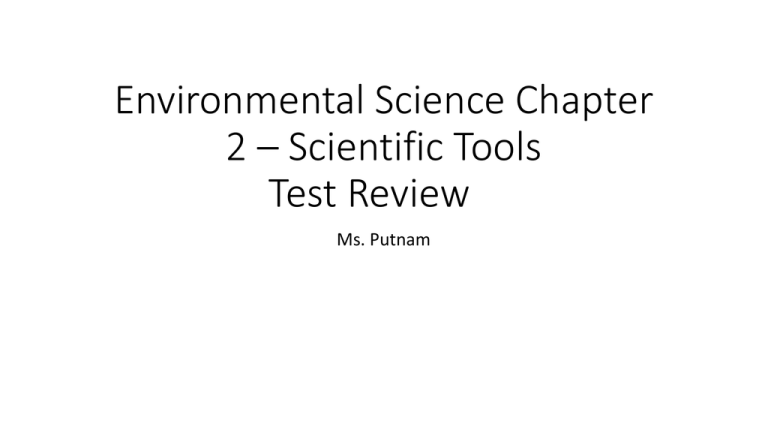
Environmental Science Chapter 2 – Scientific Tools Test Review Ms. Putnam 1. ______ is the classification and collection of data in numerical form. • Statistics 2. ______ is the group that does not receive the experimental treatment in an experiment . • Control group 3. By examining _____, scientists can test predictions for situations in which it is impossible or unethical to use experiments. • correlations 4. Scientists use predictions to… • Analyze data 5. In an experiment, the factor of interest is called the ________________ • variable 6. The average mass of an apple in a basket of apples is an example of _______. • mean 7. A model of a car is an example of a __________________________________ model. • physical 8. The chance that an tornado will occur in your town during the next year is an example of ________. • risk 9. List the 5 steps of the Experimental Method 1. 2. 3. 4. 5. Observing Hypothesizing Predicting Experimenting Communicating results 10. Identify 3 reasons why mathematical models are important: • 1. helpful in situations with many variable • 2. used to create digital images • 3. used to represent how something works 11. ___________ is the step in the experimental method scientists are conducting when they photograph a cheetah running? • observation 12. If you consider what will add to our understanding of the natural world in making an environmental decision, you are examining a(n) ________________ value. • scientific 13. Before you can make a decision using a decision-making model, list the 3 steps must you take: • 1. gather information • 2. consider which values apply to the issue • 3. explore the consequences of each option 14. In a scientific investigation, it is important that the number of objects or events being sampled be • Large enough to give an accurate estimate for the whole population A good hypothesis is more than a guess because it: • Makes logical sense 16. List the two essential characteristics a good experiment has: A control is used A single variable is tested 17. When making a decision about whether or not to build a dam and you consider how many jobs building the dam will generate. Which value are you using? • economic 18. What step in a simple environmental decision-making model are you taking when you consider whether or not people will benefit financially from setting aside land as a national park? • Exploring consequences Place the last 3 parts of the experimental method in the correct order: • Drawing conclusions • Repeating experiments • Communicating results 20. When you ask the question, “Should a nuclear waste dump site should be built near a major body of water?” you are considering what type of values? • environmental 21. To get an accurate result, a sample size must be • Large enough to give an accurate estimate of the whole population 22. Principles or standards we consider important are known as • values 23. List 3 things the decision-making model does: • 1. provides a conceptual model • 2. provides a logical process • 3. helps you make decisions 24. What is the difference between a quantitative and qualitative observation • Quantitative – measurements that must contain numbers, ex. 15 cm • Qualitative – observed with your senses, ex. Color, smell 25. The chance that an event will happen is known as ________. • probability 26. A(n) _______________________________________ is a logical statement about what will happen in an experiment if the hypothesis is correct. • prediction 27. Numeric information called _______________ is gathered in an experiment. • data 28. In statistics, the group of individuals used to represent the population is called the ____ • sample 29. Equations used to represent how a scientific process works are called ________________ models. • mathematical 30. Principles or standards we consider important are known as ________________. • values 31. When scientists are not able to use an experiment to test a prediction, ___________________ can be examined. • correlations 32. The probability of an unwanted outcome occurring is _______ • risk 33. A(n) ____________________________ model is a systematic process you can use to help you make decisions. • Decision-making 34. The ______ consists of a series of steps used by scientists to identify and answer questions. • Experimental Method 35. Information known as a(n) _______________ is gathered by using the senses. • observation 36. One step in a decision-making model is to explore both positive and negative ______________of each option. • consequences 37. The _____ is the group that does not receive the experimental treatment in an experiment. • Control group 38. The first step in the decision-making model is to ____________________________________. • Gather information 39. A(n) _______________________ is a testable explanation for an observation. • hypothesis 40. Three-dimensional models you can touch are referred to as ______________________ models. • physical 41. A(n) ___________ can explain an observation and predict what might happen in the future. • theory 42. A(n) _______________ observation is a type of observation that does not contain a number. • qualitative 43. The ______________________ variable is the variable being tested in the experiment. It is the part of the experiment that is manipulated by the experimenter. • independent 44. The ______________________ variable is the variable being measured in response to the variable being tested. • dependent 45. The city council is proposing to build a dam on the local river. Site numerous positive and negative consequences for building the dam. • Answers may vary but should reflect the student’s understanding of the decision-making model. Sample: • Positive short term consequences: construction jobs created, some home values may increase • Negative short term consequences: habitats disturbed/destroyed • Positive long term consequences: recreational opportunities, source of water and energy • Negative long term consequences: home owners that don’t want to move will lose their homes, organisms may become endangered
